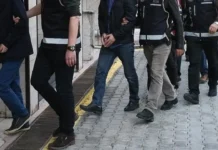The wife of Veysel Alıcı, who was arrested in February on charges of links to the Gülen movement despite his lymphoma, told the Bold Medya news website that she doesn’t want her husband to die in prison.
Speaking to Bold Medya, Şeyma Alıcı said her husband’s health is deteriorating by the day in jail, adding that Alıcı not only suffers from cancer but also struggles with other health problems. “There is a swelling in his hands and arms,” she said.
Alıcı was working as an administrator at the private Mevlana University in central Konya province. The university was one of 15 universities shut down by the Turkish government without any due process after an abortive putsch on July 15, 2016 due to alleged links to the Gülen movement, a faith-based group inspired by Turkish cleric Fethullah Gülen.
Veysel Alıcı had had several surgeries and several rounds of chemotherapy and radiation since he was diagnosed with cancer seven years ago and was told his health was very fragile.
Turkish President Recep Tayyip Erdoğan has been targeting followers of the Gülen movement since the corruption investigations of December 17-25, 2013, which implicated then-Prime Minister Erdoğan, his family members, and his inner circle.
Dismissing the investigations as a Gülenist coup and conspiracy against his government, Erdoğan designated the movement as a terrorist organization and began to target its members. He intensified the crackdown on the movement following the abortive putsch on July 15, 2016 that he accused Gülen of masterminding. Gülen and the movement strongly deny involvement in the coup attempt or any terrorist activity.
Human rights activists and opposition politicians have frequently criticized authorities for not releasing critically ill prisoners, so they can seek proper treatment.
According to the recent report by the Ankara-based Human Rights Association (İHD), there are at least 1,605 ailing inmates in the country’s prisons, 604 of whom are in critical condition. The İHD said it estimates the number of sick inmates to be higher and calls on the government to release them and delay their sentences as the coronavirus pandemic poses a further threat to their medical well-being.
Human rights defender and former Peoples’ Democratic Party (HDP) deputy Ömer Faruk Gergerlioğlu said ill prisoners were not released until they were at the point of no return. He claimed that prisoners did not have access to proper healthcare facilities such as hospitals or infirmaries.
According to a statement from Interior Minister Süleyman Soylu on February 20, a total of 622,646 people have been the subject of investigation and 301,932 have been detained, while 96,000 others have been jailed due to alleged links to the Gülen movement since the failed coup. The minister said there are currently 25,467 people in Turkey’s prisons who were jailed on alleged links to the Gülen movement.
Human Rights Watch says people alleged to have links to the Gülen movement is the largest group targeted by Erdoğan.















